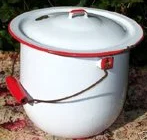On a recent post in the Wilkinson County Mississippi Genealogy Group Facebook page, Monica asked the question:
“Have you found any family members impacted during other times in history, i.e. Influenza of 1918?”
After thinking over the question for a minute I remembered a family story I was told, and my short answer is – yes.
My grandmother Beulah Veal Payne was born in 1910 to Ollie Veal and Kate Lewis of Woodville, Mississippi. From 1997-2000, my mother, along with my aunts, were her steadfast caretakers. During those years they had plenty of time to talk with my grandmother about all the stories, trials and tribulations she had had over the years.
My mother told me one story my grandmother remembered from when she was a little girl growing up in Woodville. My grandmother said they were not allowed to go outside during the “sickness” and that one person went outside of the house to empty the slop jar and dropped dead. She remembers how confined they were in the house and it was smelling bad and they were not allowed to go outside, not even to empty the slop jars.
Was this a true-to-life story or a child’s remembrance of life during a pandemic? Was the virus so contagious that children feared going outside even for a short while? What stories will children remember after being sheltered-in in the Covid-19 Pandemic of 2020? Think about it, if your bathroom toilet backed up during the Pandemic would you let a plumber into the house, that is, if you could find one who would answer your call?

“Slop jars” or “pots” were used before indoor toilets were installed in houses. If they sat around for a while they would stink, I mean really stink. If you ever smelled a stinky one before, your brain still remembers what it smelled like, right? There were designated people in the family who emptied the full slop jars every morning, in various areas outside the house. (Note: My grandmother always used the term “night mug” instead of slop jar).
The details of the warning were clear, whether the story was as she remembered it or not – don’t go outside the house. A small child born in 1910 remembered the story she was told over 80 years ago, that someone in the family had gone outside and died while emptying the slop jar. And, as a result, they were “sheltered in place” and not allowed to leave the house.
When the Facebook question was posed about the Influenza Pandemic of 1918, my thoughts immediately turned to my stack of family death certificates. My first instinct was to search for people who had died around 1918 and to find out what were the causes of death.
In an earlier blog post on Profiles of 5 Wilkinson County Civil War Black Freedom Fighters, I remembered a brief bio I wrote about Nolan Veal, who was an older cousin of my grandmother.
“Noland Veal (#35), younger brother of Madison Veal, was born in 1845 on Holy Grove Plantation in Woodville, Wilkinson County Mississippi. He married Millie Wright. In March 1863, Nolan Veal, along with Andrus Hayden (#34) and William Bladen (#19), ran away to Bayou Sara Louisiana and enlisted in the Union Navy aboard the gunboat USS Kenwood. He died April 8, 1919 on Cherryfield Plantation in Woodville, Mississippi.”
So, off to the stack of family death certificates…


Great job husband! I enjoyed reading this and it encouraged me to go back and make sure I had read all of your previous blogs. I can now appreciate all of those hours of research you have done and continue to do. Can’t wait to read your next blog!
Thanks for taking the time to read it.
Thank you for so much for sharing such great research and wonderful history. This information is really relevant, valuable (needed) today. I remember my grand parents having a slop jar and a out house. Look how far we have come and yet we still have so much progress and things to do. With everyone working together in LOVE (UNITY) we shall and will accomplish MUCH MORE!!
Thanks for reading and commenting.
Thanks for your research. Enjoyed your article.
Thanks and Happy Birthday to you!
Wow
Thanks for reading.
If they didn’t have the “outhouse”, there was areas set aside for emptying that slop jar.
My grandparents had indoor facilities but the sloop jar was part of the decor!
Flashbacks!!!!
Rob. The outhouse is another story for another day. Let me just say, all outhouses were not equal.
Good job Al it’s my first time knowing about this story. Being one who had to carry and dump a slop jar the smell is never forgotten.
Thanks Rick. I was 2 years younger than you and didn’t know you were the one who emptied the slop jar. Big brother duty.
Good job cuz. I have heard similar stories fro Aunt Janet.
Thanks Cuz. I will talk to Aunt Janet.
As always, great job!
This story is exceptional. I want to personally thank you for educating our family, neighbors and friends; regarding the history of our forefathers and therefore, our own history. This means so much to me as I’m sure it does to our community.
Thanks Evelyn for the encouragement. Stay in touch and let’s talk more often.
Enjoyed reading. Lot of research you have done. Thanks
Thanks
In the early years(pre-modern era) children were taught the lessons of life and sometimes with emphasis to etch into the memory of the children the consequences of not following instructions that are designed for their safety. These instructions were not restricted for health purposes but also for safety against those who hated Blacks and would do harm. Great piece
Mr Canady, thanks for your insight.
Wow, Al. I have vivid memories of the slop jar and outhouse. It’s hard to believe I’m not yet 60 and can recall this experience.
Great job with the blog. This was unexpected bit of history and a lesson to us today…”Don’t go outside for shit. ”
Some memories are better left suppressed!!!!
Basically, yes!
Alvin read your blog today. Raised in southern Louisiana in the sugar cane fields, I identified with traveling the winding roads at high speeds, of course the outhouse and the slop jar. Had to dump every morning and wash thoroughly before bringing back in at night. Brought back smelly memories.
Amenta. Thanks for reading and remembering. If I remember you told me you are from Vachere. Some of my folks from St. James Parish in the early 1830s ended up at Woodstock Plantation in Woodville. I need to talk to you about that Cuz.
I enjoyed this and I’m searching Woodville, MS for my grandparents parents. They are Tolivers and there are many spelling of this name. I have no passed down family history. My father was born in 1899 and he thought let the pass stay buried and why because we were treated like animals and sometimes worse. His father was born in 1860 and the 1870 census list him and his brothers but no parents. Stuck like a horse in the mud.
Bettye. Thanks for reading. The history of the Tolivers is well known in Woodville. They were not enslaved on this Plantation however. Email me and let’s discuss.
I’ve been reading backwards, part 3, part 2, Woodvilke and now part 1. I’m 5 years your junior and remember the slop jar and dreaded nightmarish outhouse. Erasing that from my mind, I’d like to concentrate on the 1918 influenza. Due to the pandemic we are experiencing today, I’d like to know if you were able to find any other family members that may have died during this time. Note: Surprisingly, I have thoroughly enjoyed all of your written historical findings! Well Done big brother!
Ramona thanks for reading. In part 2 of the 1918 blog “LaGrippe,” I list some family members who died during the 1918 pandemic.